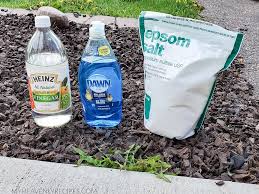Weed Killer Vinegar, In recent years, homeowners and gardeners have been exploring eco-friendly alternatives to chemical herbicides. One of the most popular solutions is weed killer vinegar, a safe, natural option for controlling weeds. This article explains what weed killer vinegar is, how it works, and tips for using it effectively in your garden.
What is Weed Killer Vinegar?
Weed killer vinegar refers to household or horticultural vinegar used as an herbicide. Unlike synthetic weed killers, vinegar offers a non-toxic method to control unwanted plants. The primary active ingredient is acetic acid, which can dehydrate and kill weeds. While household vinegar contains around 5% acetic acid, horticultural vinegar may contain up to 20% acetic acid, making it more potent for garden use.
How Does Vinegar Kill Weeds?
Vinegar is a contact herbicide, meaning it destroys the plant tissues it touches. When sprayed directly on weeds, the acetic acid breaks down the cell membranes, causing the plant to dry out and die. However, it works best on young or small weeds with shallow roots. Tougher, deep-rooted weeds may require repeated applications or complementary treatments.
Pros and Cons of Weed Killer Vinegar:
Pros:
- Environmentally friendly: Safe for pets, humans, and pollinators if used correctly.
- Non-toxic: No harmful residues in soil or water.
- Easy to use: Requires minimal preparation, and ingredients are affordable.
Cons:
- Non-selective: Vinegar kills all plants it touches, including desirable ones.
- Temporary: May need reapplication, especially on hardy weeds.
- Not effective on roots: It mainly affects above-ground parts, so stubborn weeds may regrow.
How to Use Vinegar as a Weed Killer
- Choose the Right Type of Vinegar:
Household vinegar is suitable for small weeds, but horticultural vinegar is recommended for tougher ones due to its higher acetic acid concentration. - Mix with Caution:
You can enhance the effectiveness by mixing vinegar with a few drops of dish soap, which helps the solution stick to leaves. For extra power, add salt (though it may harm the soil if overused). - Apply in Ideal Conditions:
Spray on a sunny, dry day for maximum effectiveness. Avoid spraying before rain, as the solution may wash away before it takes effect. - Spot-Treat Carefully:
Since vinegar kills all plants it contacts, use it for spot treatments rather than general spraying. Shield nearby plants with cardboard or plastic barriers. - Reapply as Needed:
Stubborn weeds may need a second or third application. Monitor results over the next few days and follow up if necessary.
Safety Considerations
While weed killer vinegar is natural, it should still be handled with care.
- Wear protective gloves and eyewear when using horticultural vinegar, as higher concentrations can irritate skin and eyes.
- Store vinegar safely out of reach of children and pets.
- Avoid overuse to prevent soil damage from the acidic solution.
Conclusion
Weed killer vinegar is an affordable, natural, and eco-friendly option for tackling weeds without resorting to harsh chemicals. While it may not be as potent as synthetic herbicides, it offers an effective solution for small-scale weeding with minimal environmental impact. With careful application, vinegar can keep your garden weed-free, naturally.
Switching to natural herbicides like vinegar not only helps protect the environment but also ensures that your garden remains safe for family, pets, and beneficial wildlife. Next time you spot weeds creeping in, consider reaching for a bottle of vinegar instead of chemical alternatives!
You Might Also Like These:



